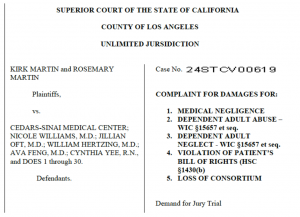
Message to Hospitalist: Stage III/IV Bedsores, Reconstructive Surgery ‘Should be Performed’
Hospitalists must ensure safe discharge for patients with severe pressure ulcers—reconstructive surgery access is essential to meet the standard of care
SANTA BARBARA, CA, UNITED STATES, June 10, 2025 /EINPresswire.com/ -- "Patients with hospital-acquired decubitus ulcers cannot be discharged to facilities that lack the capability to perform reconstructive surgery for cure, as this is an unsafe discharge. Hospitalists who authorize such discharges are exposed," states Greg Vigna, MD, JD, Board Certified Physical Medicine and Rehabilitation.
Dr. Greg Vigna, MD, JD, national bedsore attorney, states, “For decades, physicians have known of the significant risk of malnutrition, sepsis, and septic shock caused by pressure injuries. As a practicing physician at an Long-Term Acute Care (LTAC) hospital, with the support of the medical staff and the involvement of plastic surgeons, we provided a safe environment for the transfer of patients with serious injuries. These patients were evaluated and placed on appropriate care pathways—one involving reconstructive surgery, and the other focused on palliative wound care—based on an understanding of the risks and benefits of both treatment options."
Dr. Vigna continues, “During my residency training at Baylor College of Medicine, I gained a deep understanding of the benefits of reconstructive surgery and the grave prognosis and quality of life of patients with Stage IV decubitus ulcers with osteomylitis. Discharging these patients to nursing homes or back into the community was close to a death sentence. The standard of care in these cases is clear.”
What does the WHS Guidelines 2023 update report as to the standard of care?
“Preamble: Surgical treatment of pressure injury/ulcers is often considered to be a final invasive choice for wounds refractory to less aggressive care or for use when rapid closure is indicated, however, recent literature suggests that surgery can and should be performed safely in properly selected patients.
Guideline 6.8: A pressure ulcer should be closed surgically if it does not respond to wound care and there is no other contraindication to the surgical procedures. Exceptions may include the elderly or patients with a fatal illness, for whom palliative, local wound care is more appropriate. (Level I – increased).
Principle: Wound closure decreases protein loss, fluid loss, the possibility of wound infection, and the later development of malignancy in the wound. Early complication rates are acceptably low."
Read the WHS Guidelines: https://onlinelibrary.wiley.com/doi/full/10.1111/wrr.13130
Dr. Greg Vigna states, “The prognosis of Stage IV decubitus ulcers, also known as decubitus ulcers or bedsores, is poor, with a 17% risk of death within one year or 44% readmission due to complications of osteomylitis.”
Read about the prognosis of decubitus-related osteomyelitis: https://journals.sagepub.com/doi/full/10.1177/20499361231196664
Dr. Vigna states, “Hospitalists have a duty to ensure patients are safe in the hospital. If a hospital-acquired deep tissue injury occurs, the hospitalist, as the attending physician, must prescribe a Clinitron bed to prevent further injury by the failures of the nursing staff. Early surgical debridement is required to remove the source of dead tissue that can lead to sepsis. Nutritional support, including sufficient protein, must be provided to support granulation. Infections must be treated. Patients should not be discharged until plastic reconstruction surgery consultation has been obtained or the patient is being referred to another hospital that can provide these services."
Dr. Vigna continues, “We have seen cases where hospitalists do not independently assess impaired skin even when it is noted by nursing staff. As the attending physician, a hospitalist cannot defer initial assessment of skin impairments to nurses, and certainly cannot defer the treatment plan to nurses. I don’t care where a hospitalist practices, if they are the attending physician, they must personally assess each wound and ensure their patient is safe from further injury.”
Dr. Vigna, concludes, “In this case, we allege that the hospitalist failed to independently assess the wound, which was not initially identified as a pressure injury by the nursing staff. All the hospitalist needed to do was independently evaluate the wound and order a Clinitron bed. By failing to take action to protect their patient from ongoing injury caused by poor nursing care, the hospitalist failed in their responsibility and, we allege, breached the standard of care expected from a reasonable hospitalist."
Greg Vigna, MD, JD, is a national malpractice attorney and an expert in wound care. He is available for legal consultation for families and patients who have suffered decubitus ulcers due to poor nursing care at hospitals, nursing homes, or assisted living facilities. The Vigna Law Group, along with Ben C. Martin, Esq., of the Ben Martin Law Group, a Dallas, Texas national pharmaceutical injury law firm, jointly prosecute hospital and nursing home neglect cases that result in bedsores nationwide.
Case No: 24STCV00619
Superior Court of the State of California, County of Los Angeles
Greg Vigna, MD, JD
Vigna Law Group
+ +1 8178099023
email us here
Visit us on social media:
LinkedIn
Facebook
X
Distribution channels: Business & Economy, Education, Healthcare & Pharmaceuticals Industry, Law, Science
Legal Disclaimer:
EIN Presswire provides this news content "as is" without warranty of any kind. We do not accept any responsibility or liability for the accuracy, content, images, videos, licenses, completeness, legality, or reliability of the information contained in this article. If you have any complaints or copyright issues related to this article, kindly contact the author above.
Submit your press release

